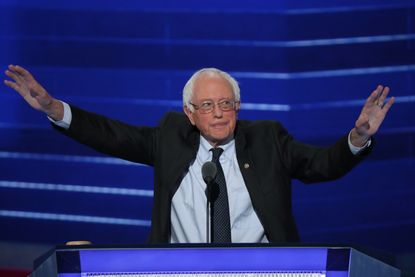Donald Trump is right. Bernie Sanders sold out. But here's what he got.
It sure as hell wasn't for nothing


When Donald Trump tweeted after Bernie Sanders' speech that Sanders "totally sold out to Crooked Hillary Clinton. All of that work, energy and money, and nothing to show for it! Waste of time!" he was exactly half right. Maybe you'll quibble with the verb, but Sanders did capitulate to Hillary Clinton. But he sure as hell didn't sell out for nothing.
He sold out, and Clinton changed her position on the Trans-Pacific Partnership as a result, probably dooming that trade bill, a signature piece of President Obama's second-term foreign policy agenda.
He sold out, and the Democrats changed their superdelegate rules, binding a much larger percentage of them to the popular vote winners of state contests. At a minimum, this means that establishment candidates will be forced to organize more heavily at a lower level of politics in more states in the future.
Subscribe to The Week
Escape your echo chamber. Get the facts behind the news, plus analysis from multiple perspectives.

Sign up for The Week's Free Newsletters
From our morning news briefing to a weekly Good News Newsletter, get the best of The Week delivered directly to your inbox.
From our morning news briefing to a weekly Good News Newsletter, get the best of The Week delivered directly to your inbox.
He sold out, and he and Clinton are now on board with a college tuition proposal that would satisfy Sanders' criteria, not the one Clinton initially believed in.
He sold out, and the party endorsed what Rep. Keith Ellison (D-Minn.) called its "most progressive platform in history."
He sold out, and he received a primetime speaking slot, getting a chance to give what amounted to a concise version of his campaign stump speech, without filters.
He sold out, and his own name will get to be held up for the nomination on Tuesday.
He sold out, and the superdelegates he's attempted to persuade still have the freedom to vote for the candidate of their choice.
He sold out, and his supporters will have greater access to the reins of power inside the party. They will get to determine the rules, going forward.
He sold out, and Hillary Clinton, loathe to commit to hold a potential Supreme Court justice to any standard other than to recognize that the Constitution lives and breathes, now must nominate a justice who specifically opposes a settled law of the land.
The #BernieOrBust delegates who interrupted their own candidate with boos last night, the ones who marched alongside a giant doobie outside the convention, and the few who tried to throw Elizabeth Warren off stride with cries of "We Trusted You!" are like the people who carry phones with cracked screens, refusing to get them replaced, even for free.
In Trump's mind, since Sanders didn't get the private plane his staff had asked the DNC for, perhaps Sanders got nothing. That's because in Trump's mind — as in the mind of the #BernieOrBust folks — not getting everything is the same as getting nothing.
If you watched the convention on television, your day likely began with news footage of contention. The midpoint was, funnily enough, comedian Sarah Silverman's shade throw from the platform, calling the #BernieorBust movement "ridiculous." The peak was Michelle Obama's speech, which was among the most effective arguments I've heard anyone make for Hillary Clinton. And Sanders himself was the denouement. Thanks to judicious directing by the television pool, the crying, defiant Sanders supporters seemed to be energized at the beginning of the day, reproached by the middle, and crying, resigned (perhaps) to his defeat by the end.
The truth, I suspect, is that the media just went fishing for a narrative. Clinton has the support of about 85 percent of Sanders' supporters nationwide already; Trump has the support, after his convention, of about 85 percent of all Republicans who said they voted in their primaries. Both parties are going forward relatively united. How enthusiastic they are relative to their unity is a separate question — and it is one that, uniquely, and perhaps alone, Hillary Clinton will be responsible for answering.
Create an account with the same email registered to your subscription to unlock access.
Sign up for Today's Best Articles in your inbox
A free daily email with the biggest news stories of the day – and the best features from TheWeek.com
Marc Ambinder is TheWeek.com's editor-at-large. He is the author, with D.B. Grady, of The Command and Deep State: Inside the Government Secrecy Industry. Marc is also a contributing editor for The Atlantic and GQ. Formerly, he served as White House correspondent for National Journal, chief political consultant for CBS News, and politics editor at The Atlantic. Marc is a 2001 graduate of Harvard. He is married to Michael Park, a corporate strategy consultant, and lives in Los Angeles.
-
 Why au pairs might become a thing of the past
Why au pairs might become a thing of the pastUnder The Radar Brexit and wage ruling are threatening the 'mutually beneficial arrangement'
By Chas Newkey-Burden, The Week UK Published
-
 'A direct, protracted war with Israel is not something Iran is equipped to fight'
'A direct, protracted war with Israel is not something Iran is equipped to fight'Instant Opinion Opinion, comment and editorials of the day
By Harold Maass, The Week US Published
-
 Today's political cartoons - April 17, 2024
Today's political cartoons - April 17, 2024Cartoons Wednesday's cartoons - political anxiety, jury sorting hat, and more
By The Week US Published
-
 Arizona court reinstates 1864 abortion ban
Arizona court reinstates 1864 abortion banSpeed Read The law makes all abortions illegal in the state except to save the mother's life
By Rafi Schwartz, The Week US Published
-
 Does the world face a retirement crisis?
Does the world face a retirement crisis?Today's Big Question And can it be solved by raising the retirement age?
By Joel Mathis, The Week US Published
-
 Trump, billions richer, is selling Bibles
Trump, billions richer, is selling BiblesSpeed Read The former president is hawking a $60 "God Bless the USA Bible"
By Peter Weber, The Week US Published
-
 The debate about Biden's age and mental fitness
The debate about Biden's age and mental fitnessIn Depth Some critics argue Biden is too old to run again. Does the argument have merit?
By Grayson Quay Published
-
 How would a second Trump presidency affect Britain?
How would a second Trump presidency affect Britain?Today's Big Question Re-election of Republican frontrunner could threaten UK security, warns former head of secret service
By Harriet Marsden, The Week UK Published
-
 'Rwanda plan is less a deterrent and more a bluff'
'Rwanda plan is less a deterrent and more a bluff'Instant Opinion Opinion, comment and editorials of the day
By The Week UK Published
-
 Henry Kissinger dies aged 100: a complicated legacy?
Henry Kissinger dies aged 100: a complicated legacy?Talking Point Top US diplomat and Nobel Peace Prize winner remembered as both foreign policy genius and war criminal
By Harriet Marsden, The Week UK Last updated
-
 Trump’s rhetoric: a shift to 'straight-up Nazi talk'
Trump’s rhetoric: a shift to 'straight-up Nazi talk'Why everyone's talking about Would-be president's sinister language is backed by an incendiary policy agenda, say commentators
By The Week UK Published